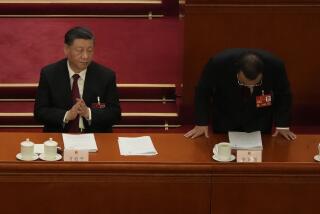High-Level Peking Meeting May Oust Party Leader Hu
- Share via
PEKING — The Chinese Communist Party on Wednesday convened an extraordinary high-level meeting that, according to Peking-based diplomats, may soon approve changes in the party leadership.
The diplomats said it appears increasingly likely that the meeting was called to approve the ouster of Hu Yaobang, the top aide to Chinese leader Deng Xiaoping, as general secretary of the party.
Foreign Communist newspapers have printed rumors that Hu will be replaced as party chief by Premier Zhao Ziyang. The premier is another Deng protege, but he has concerned himself primarily with economic reform and not with questions of political or ideological change.
Hu has not been seen in public for more than two weeks. A spokesman for the party’s International Liaison Department said Monday that Hu has health problems. The spokesman would not respond to questions about whether Hu is still general secretary of the party.
A Western diplomat said he believes that the party has called a special meeting of the Central Committee, the 209-member group responsible for setting the overall direction of party policy.
“The meeting is now under way,” he said.
Generally, the Central Committee meets only about once a year. It met last September and had not been expected to meet again until next fall. One source said he is not sure whether the full Central Committee is meeting or whether it is a smaller group of party leaders.
It has been more than a decade since the party hurriedly purged someone of Hu’s stature from his leadership posts. The last time it happened was in April, 1976, and the victim was Deng himself. After a massive demonstration at Tian An Men Square in Peking, the party, then dominated by leftists including Mao Tse-tung’s wife, Jiang Qing, ousted Deng from his posts as vice premier and party vice chairman. The decision was made by the Politburo in the name of the full Central Committee.
Meanwhile, authorities announced Wednesday that a prominent Shanghai writer and editor, Wang Ruowang, has been formally expelled from the Communist Party.
A decision by the party’s Shanghai Municipal Disciplinary Inspection Commission said that Wang had “advocated bourgeois liberalization . . . since 1979, especially over the past two years.”
“He opposed party leadership over literature and art and attempted to have it liquidated,” the decision said.
‘Advocated Capitalist Road’
Wang was also accused of “advocating the capitalist road. . . . He called for a makeup of capitalism, which he said China had missed.”
Wang, 68, is a veteran party intellectual. At age 16, after writing a satire about Chiang Kai-shek, he was imprisoned by Chiang’s Nationalist regime. In 1937 he joined the Communist Party in its wartime headquarters at Yanan.
A victim of Mao’s “anti-rightist” campaign of 1957, Wang spent most of the next two decades in labor camps or prisons.
After he was rehabilitated, in 1978, he wrote a book called “Trilogy of Hunger” in which he said that prison life seemed better under the Nationalists than under the Communists during the Cultural Revolution.
Wang argued repeatedly that party authorities were trying to interfere too much in the fields of literature and the arts. In 1980, for example, he wrote that Chinese dramatists and film directors were producing inferior works because “our responsible comrades have paid too much attention to movies and plays.”
Takes Ouster Lightly
Last Monday, in an interview with Hong Kong’s South China Morning Post, Wang said he had already heard that he would be purged from the party.
“They won’t harm me,” he said. “I’m already retired, and no one’s been willing to publish my works for a long time, anyway.”
The official New China News Agency said Wednesday night in a toughly worded commentary that “no party member is allowed to advocate bourgeois liberalization.” It went on to say that the freedom to air different points of view in China has clear and defined limits.
“There will never be freedom to air different views as regards issues concerning the need to uphold the four cardinal principles,” it said. “. . . All party members are equal before the disciplinary board of the party.”
The “four cardinal principles” include socialism, the dictatorship of the proletariat, the leadership of the Communist Party and belief in Marxism, Leninism and Mao Tse-tung thought.
A separate article in Red Flag, the party theoretical journal, reprinted Wednesday in the People’s Daily, said that the principle of the dictatorship of the proletariat is especially important, because it helps to protect socialism, Marxism and the leadership of the Communist Party.
More to Read
Sign up for Essential California
The most important California stories and recommendations in your inbox every morning.
You may occasionally receive promotional content from the Los Angeles Times.













